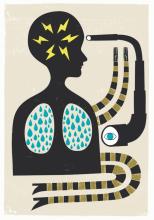The mind-mucus connection
By Bruce Goldman
Next time it feels like you’re sneezing your brains out or coughing up a lung, consider that brains and lungs have something very much in common: They share some secrets about secretion. Nerve cells in the brain take the high road, emitting bursts of chemicals in order to pass their signals from one to the next (a process known as neurotransmission). Goblet cells in the lung take the low road, squirting out rivers of mucus when they get irritated.
Yep, mucus. Like it or lump it, we can’t live without it. We don’t think too much about the sometimes slimy, sometimes sticky, sometimes lumpy stuff, and when we do, we don’t think much of it. But our health hinges on it.
In the right amounts, at the right consistency, mucus is a lung’s best friend. It’s also essential to the proper function of the stomach, intestine and urogenital tract. But if there’s too much of it, or if it’s too adhesive, it can betray the organ it is meant to serve.
Take the lungs, for example. Airway blockage by overly sticky mucus is a hallmark of several serious respiratory disorders and a major medical problem. In the United States alone, more than 25 million people have asthma and about 2.5 million of them are unable to find relief from existing drug treatments.
